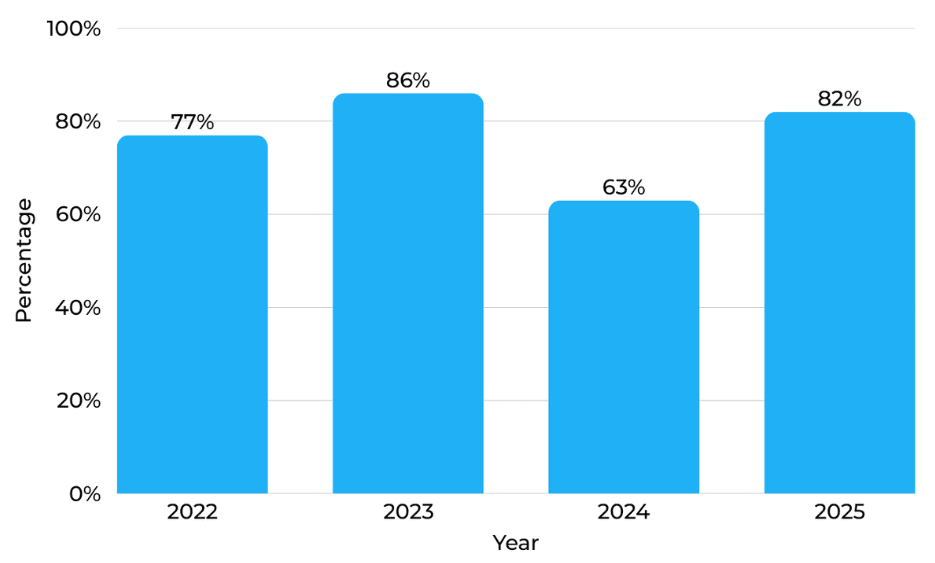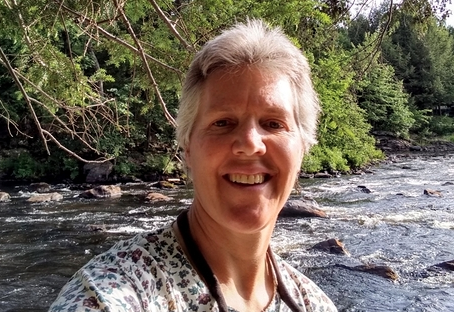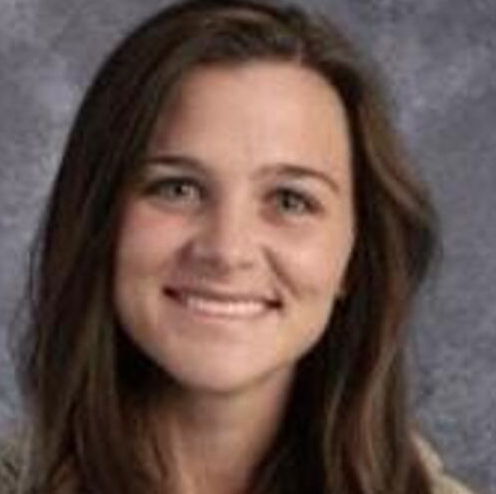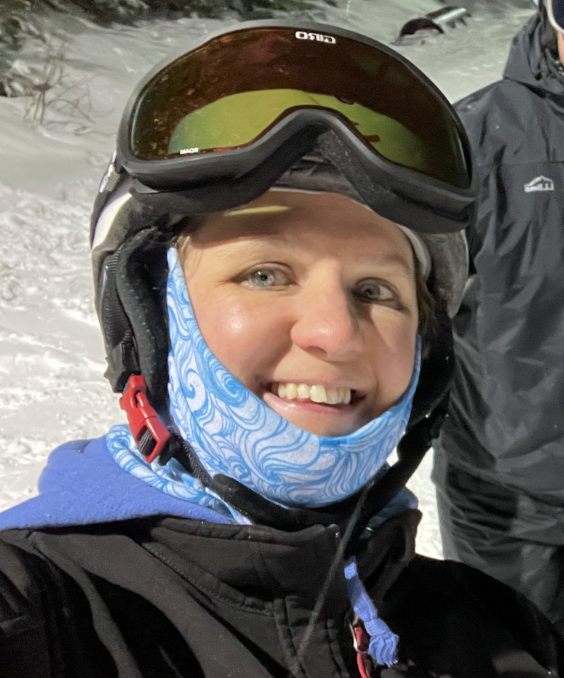School Profile
We do school differently.
Intentionally designed to meet students where they are, VLACS is a flexible way to do school.

View the 2-page .PDF version here.
What is VLACS?
The Virtual Learning Academy Charter School (VLACS) is a 501(c)3 nonprofit, state-approved public charter school. VLACS is free for New Hampshire residents and is available via tuition to students outside of New Hampshire. All VLACS administrators, instructors, and advisors are NH-certified and deemed highly qualified according to State standards. While we follow the same guidelines and provide the same annual data at the state level as traditional brick-and-mortar schools do, our school model is very different — intentionally and by design. This School Profile tells our story. Where applicable, the information we share includes the state’s School and District Report Card data as well as our students’ and educators’ stories behind the numbers based on our unique model.
VLACS is Personalization
At VLACS, we serve students in grades K-12 worldwide in both part-time (PT, supplemental) and full-time (FT) capacities. VLACS is free for New Hampshire residents and is available via tuition to students outside of New Hampshire. All VLACS administrators, instructors, and advisors are NH-certified and deemed highly qualified according to State standards.
Part-time Programs
Students who attend VLACS part time are typically enrolled in a traditional school, homeschooled, or part of an alternative learning program. There are myriad reasons why part-time students supplement their local schooling with us at VLACS:
- Scheduling conflicts at their brick-and-mortar school
- More choices for courses than their brick-and-mortar school
- Student or family member facing illness that requires them to be at home- or hospital-bound
- Student experiencing anxiety or being bullied
- Preference to learn from home
- And many more…
No matter how students join VLACS, each is served in a personalized way.
Full-time Programs
Students who are interested in our FT program fill out an application and are notified of their acceptance. Once accepted, our FT students are assigned an advisor who supports them both personally and academically throughout their time at VLACS. Our advisors meet with each student as well as the student’s parents/caregivers once a month as a check-in to see how the student is doing and if they need additional support. Our advisors also counsel students on what courses to enroll in and what pace students should take based on their specific needs.
We offer a rigorous, flexible learning environment where students complete their work with pacing guidelines wherever they want and during times that meet their individual needs and schedules. Students advance when they are ready and work one-on-one with their instructors along the way. Our instructors and advisors listen to the needs and interests of students and their families. Instructors and advisors have the flexibility to think beyond the traditional constraints of school to create meaningful, relevant experiences for each student.
At VLACS, we’ve created a learning environment where place and time are no longer limits; instead, they are assets that our students use to gain real-world experiences and build new skills through internships, career connections, project-based learning, and more. Students admitted to the full-time program pursue a VLACS diploma that is approved by the New Hampshire Department of Education.
VLACS is Flexible
The flexible learning environment we offer allows students to choose when, where, and how they learn based on their needs, interests, and talents. Some of our students are musicians, artists, actors, professional athletes, and more. The flexibility VLACS offers is perfect for students’ busy schedules, even offering them opportunities to take fewer classes when they need more balance. One of our graduates, Pi Gracen Rochford Richardson, explained that VLACS’ flexibility allowed them to spread their coursework throughout the year instead of having to do all of it in a traditional school schedule.
VLACS Student Spotlight
Cailean Anderson, a recent graduate, is an actress.
“VLACS allows me to travel all over New Hampshire, perform in different places, make connections with others, and gives me a glimpse of what it might be like to perform professionally one day.”
Another graduate, Cailean Anderson, is an actress. Cailean needed to find a balance between her rehearsals, performances, and schoolwork. For example, at the start of her sophomore year, she was taking five or six classes at once. One of her VLACS advisors reached out and said, “Hey, how are you? Are you doing okay? Do you want to re-work your school year so you have more flexibility in your schedule?” Cailean was grateful and expressed, “I love how my advisor was looking out for me, knowing I needed to find balance while I was juggling my musical, rehearsals, and classwork.” Learn more about Pi and Cailean’s stories in the following video.
VLACS is Supportive
In addition to Advisors, VLACS teachers and other support structures are in place to help students be successful and prevent them from slipping through the cracks. Jackie Gilbert, a full-time faculty member at VLACS, shared that she and the rest of the VLACS team support students by “opening up lines of communication” from the start so that students and their guardians/parents feel supported and comfortable reaching out when the need arises. The regular communication helps Jackie and the rest of the VLACS faculty and staff keep a finger on the pulse of each student’s needs. The VLACS team also regularly shares expectations and requirements of the program so that everyone is on the same page. Additional student supports include but are not limited to welcome calls for every class (even for experienced VLACS students), monthly calls with student and guardian/parent, discussion-based assessments, progress reports, and more. Some additional supports that have been added include the following:
For our full-time students, academic and executive skills coaching to refresh a student’s understanding of core concepts and skills are offered based on advisor or instructor referrals.
- At the middle school and high school levels, Math Topics are offered to support students who need additional help.
- At the middle school level, discussion-based assessments have been modified to more clearly align in the areas where students are struggling.
- In the primary grades, Math and English Language Arts supports for foundational skills have been developed for students who are struggling.
VLACS is Relationships and Community
VLACS isn’t just a school. It’s a thriving, growing community made up of diverse students, faculty and staff, and leadership, as well as our school and business partners. We find that when students are empowered to make decisions about their own education, they learn to advocate for themselves. When that advocacy is coupled with the meaningful relationships they form with VLACS instructors and advisors, we witness a powerful trust develop, and because of that trust, our students excel.
VLACS Faculty Spotlight
According to Pete Galamaga, an adjunct English instructor at VLACS, the welcome call is where the relationship-building with students and their families begins.
“The mission statement for VLACS can be summed up in one word: relationships. From the welcome call to the check-in, to the monthly calls, emails, the just-in-time video and phone calls. There are all kinds of pieces that come together that really make relationship building the priority at VLACS.”
Relationships Set VLACS Apart
At VLACS, we know that when teachers truly get to know their students, and they have the tools and flexibility they need to meet them where they are and help them get where they want to go, amazing things become possible.
The Growing VLACS Community
VLACS currently has over 10,000 full- and part-time students, with over 20,000 course enrollments. Our student population comes from over 280 New Hampshire communities, 27 states, and nine countries. About 90% of our FT students start as PT.
You can see our FT and PT student enrollment growth over the last several years:
Total Number of VLACS Students Per School Year
| School Year | # of Full-time Students | # of Part-time Students | Total # of Students |
|---|---|---|---|
| 2020-21 | 551 | 12,137 | 12,688 |
| 2021-22 | 671 | 10,252 | 10,923 |
| 2022-23 | 731 | 10,636 | 11,367 |
| 2023-24 | 642 | 10,341 | 10,983 |
| 2024-25 | 720 | 11,739 | 12,459 |
Advisory
Advisory at VLACS is more than just a course; it’s a core part of how we support full-time students in navigating their academic paths and planning for their futures. From middle school through high school, Advisory is a required, credit-bearing experience that provides structure, guidance, and connection as students grow both academically and personally.
Through Advisory, students are matched with an advisor who becomes a consistent point of contact, much like a school counselor in a traditional setting. These relationships help students feel supported, seen, and prepared as they move forward.
Why Advisory Matters
Advisory is built on the idea that students thrive when they have time, space, and trusted adults to guide them through important questions, such as Who am I? What am I interested in? Where am I headed? How will I get there?
As the world of work and education shifts rapidly, it’s more important than ever that students are equipped with skills beyond core academics. Advisory helps students explore their interests and talents through:
- Relevant coursework
- Career Connections
- Job shadows and internships
- Community service (10 hours per year)
- Self-reflective journaling and future planning
Students are also asked to create a personalized future plan, bringing together what they’ve learned about themselves and the world into a meaningful culminating project.
What Students Can Expect in Advisory
Advisory isn’t a one-size-fits-all program; rather, it’s a flexible, intentional space where students engage in personalized learning and build essential life skills. As part of Advisory, full-time VLACS students are automatically enrolled once admitted, meet monthly with their advisor, participate in group webinars on topics like college planning and career readiness, complete projects focused on self-awareness, academic growth, and future goals, and fulfill community service each year.
Advisory ensures every student has someone in their corner to help them stay on track, make informed decisions, and connect their education to what matters most to them.
Whether students are college-bound, considering military service, launching a business, or pursuing something uniquely their own, Advisory is designed to help them build the confidence, clarity, and skills to move forward with purpose. It’s not just about getting through school; it’s about preparing for life after it. At its core, Advisory is where students take the wheel. VLACS gives them the time and support to practice steering.
Curriculum and Assessment
Students must demonstrate mastery of competencies in addition to earning passing grades. Instructors evaluate progress and provide interventions through the variety of assessments built into a course, as well as through one-on-one contact with the student in other venues. Assessments can be in the form of self-checks, practice lessons, multiple-choice questions, writing assignments, peer reviews, projects, research papers, essays, oral assessments, exams, and discussion-based assessments.
In order to graduate, the following course requirements need to be completed.
Minimum Graduation Requirements
| Arts Education | 0.5 |
| Information & Communications Technologies | 0.5 |
| English | 4.0 |
| Mathematics (including Algebra 1 and 0.5 credits in Geometry or equivalent) | 3.0 |
| Math Topics (if required) | 0.5 |
| Sciences | 2.0 |
| Social Studies | 3.5 |
| Physical Education / Health | 1.5 |
| Career Requirements (job shadow, micro internship, career connections) | 0.5 |
| Advisory (1 credit for each year of full-time enrollment) | 1.0 – 4.0 |
| Electives | 6.0 – 7.5 |
| TOTAL | 22.5 – 24.0 |
Grading Scale – 25-26 Academic Year*
| Grade Value** | ||
|---|---|---|
| A+ | 97-100 | 4.00 |
| A | 93-96 | 4.00 |
| A- | 90-92 | 3.67 |
| B+ | 87-89 | 3.33 |
| B | 83-86 | 3.00 |
| B- | 80-82 | 2.67 |
| C+ | 77-79 | 2.33 |
| C | 73-76 | 2.00 |
| C- | 70-72 | 1.67 |
| D+ | 67-69 | 1.33 |
| D | 63-66 | 1.00 |
| D- | 60-62 | .67 |
| F | 0-59 | 0.00 |
State & National Assessments
VLACS offers students access to college preparatory curriculum, honors, advanced placement (AP), dual college / high school credit courses (through UNH, SNHU, and the Community College System of NH), competency recovery, and special interest courses. VLACS has open enrollment for honors, AP, and dual enrollment courses.
This allows students to explore a variety of career options through various entry points or to pursue focused learning about a specific career.
State Assessment – VLACS & State Data

AP Scores 2023-2024


Graduation Rates
Our students all have unique stories, and they come to us for different reasons. Some are from military families, while others are elite athletes. Some are hospital or homebound, recovering from illness themselves, or supporting the care of a loved one. Others have totally ordinary stories: they want a course their school doesn’t offer, need to satisfy credits in ways they can’t in their school, have been experiencing bullying at their school, and more. Similarly, students leave when they need to. Some only plan to stay at VLACS for a short time, while others stay for their whole learning experience.
Because of the need for flexibility and personalization for each student who enrolls in our school, we are a competency-based program where students work at their own pace through the competencies they need to graduate. Some competencies are ones that students excel in and might go through really easily while others might be really challenging and take students a bit longer to complete. Each student’s journey at VLACS is a personalized one that meets their learning needs and their lifestyles.
Accordingly, we have some students who graduate within three years while others may take five or six years. In addition, our students can graduate at any time during the year once they complete their competencies, so the state’s traditional May/June graduation doesn’t factor in that VLACS students are graduating throughout the year. We do not penalize students because they take longer than the traditional four years to matriculate. Instead, we meet each student where they are and support them as they work through the program in whatever way is meaningful for them.
Because of our intentionally unique approach, our graduation data differs from what is reported in the state’s School and District Report Card analysis. According to the state’s data, our graduation rate has been between about 66% and 71% over the last four years.
| Academic Year | Graduation Rate |
|---|---|
| 2020-21 | 66.88% |
| 2021-22 | 66.67% |
| 2022-23 | 70.79% |
| 2023-24 | 69.75% |
| 2024-25 | Available 10/1/25 |
The data in the table below show the actual number of VLACS graduates per year between July 1 through June 30 each year.
| School Year | Total # of Graduates | |||
|---|---|---|---|---|
| 2020-21 | 137 | |||
| 2021-22 | 146 | |||
| 2022-23 | 160 | |||
| 2023-24 | 157 | |||
| 2024-25 | 167 |
Students’ Journeys After VLACS
Our full-time students have become entrepreneurs, enrolled in trade schools, enlisted in various branches of the military, and have been accepted at over 150 different colleges and universities around the world (see table below).
| Academic Year | 2020-21 | 2021-22 | 2022-23 | 2023-24 | 2024-25 |
|---|---|---|---|---|---|
| Postsecondary Enrollment Rate | 42.48% | 35.29% | 54% | 59% | |
| 4-year schools | 30% | 37% | 38% | 39% | 33% |
| 2-year schools | 22% | 16% | 21% | 15% | 16% |
| Military | 3% | 2% | 1% | 2% | 1% |
| Career | 20% | 19% | 24% | 34% | 30% |
| Gap Year/Travel | 25% | 26% | 16% | 10% | 20% |
State Assessment – VLACS Data Compared to State Data
| Academic Year | VLACS ELA Proficiency Level | State ELA Proficiency Level | VLACS Math Proficiency Level | State Math Proficiency Level | VLACS Science Proficiency Level | State Science Proficiency Level |
|---|---|---|---|---|---|---|
| 2018 – 2019 | 83% | 58% | 60% | 48% | *N | 41% |
| 2019 – 2020 | 61% | 56% | 28% | 48% | 42% | 39% |
| 2020 – 2021 | COVID | COVID | COVID | COVID | COVID | COVID |
| 2021 – 2022 | 89% | 52% | 58% | 38% | *N | 37% |

Full-year and half-year AP courses are worth 1.5 and .75 credits respectively.
College Attendances (Full-Time Students)
A growing list of the colleges and universities our FT students have attended after graduating are listed below.
Adelphi University
Adrian College
Aiken Technical College
Albertus Magnus College
Alfred University
Alvernia University
AMDA College of the Performing Arts – Los Angeles
American International College
American University
Amherst College
Anna Maria College
Appalachian State University
Arcadia University
Arizona State University
Assumption University
Athens Technical College
Ave Maria University
Babson College
Bard College
Bay Path University
Bay State College
Baylor University
Becker College
Belmont University
Benedictine College
Bentley University
Berklee College of Music
Berry College
Borough of Manhattan Community College of the CUNY
Bowling Green State University
Brandeis University
Bridgewater State University
Brigham Young University
Bryant University
Buffalo State University, State University of New York
Castleton University
Catholic University of America
Cazenovia
Cedarville University
Central Maine Community College
Champlain College
Chatham University
Clark University
Clarkson University
Coastal Carolina University
Colby-Sawyer College
College of Charleston
College of the Holy Cross
Colorado College
Colorado School of Mines
Colorado State University
Columbia College
Columbia College Chicago
Columbia University
Concordia University
Curry College
Dartmouth College
Daytona State College
Dean College
Denison University
DePaul University
DeSales University
Drew University
Drexel University
East Carolina University
Eckerd College
Elizabethtown College
Elmira College
Elon University
Embry-Riddle Aeronautical University-Prescott
Emerson College
Emerson College
Emmanuel College
Endicott College
Fisher College
Fitchburg State University
Flagler College
Florida Atlantic University
Florida Gulf Coast University
Florida Institute of Technology
Florida International University
Florida State University
Fordham University
Franciscan University of Steubenville
Franklin & Marshall College
Franklin Pierce University
Full Sail University
George Mason University
George Washington University
Georgia Institute of Technology-Georgia Southern University
Georgian Court University
Gordon College
Grand Canyon University
Granite State College
Great Bay Community College
Green Mountain College
Gustavus Adolphus College
Hampshire College
Harcum College
Harvard Extension School
Harvard University
High Point University
Hofstra University
Houghton College
Husson University
Indiana University, Bloomington
Indiana Wesleyan University-Marion
Ithaca College
Jacksonville University
James Madison University
Johnson & Wales University
Keene State College
Kent State University at Kent
King’s College London
Laird Institute
Lakes Region Community College
Lander University
Lasell University
Lebanon Valley College
Lesley University
Liberty University
Lindenwood University
Los Angeles College of Music
Loyola Marymount University
Lynn University
Manhattan College
Marlboro College
Marquette University
Marymount Manhattan College
Marywood University
Massachusetts College of
Massachusetts College of Art and Design
Massachusetts College of Liberal Arts
Massachusetts College of Pharmacy & Health Sciences
Massachusetts Institute of Technology
Massasoit Community College
MCHPS University
Merrimack College
Metropolitan State University of Denver
Miami University, Oxford
Michigan State University
Michigan Technological University
Middle Tennessee State University
Rensselaer Polytechnic Institute
Rhode Island College
Rivier University Roanoke College
Rochester Institute of Technology
Roger Williams University
Rutgers University
Sacred Heart University
Saint Anselm College
Saint Joseph’s College of Maine
Saint Joseph’s University
Saint Michael’s College
Saint Xavier University
Salem State University
Salve Regina University
San Diego State University
Savannah College of Art and Design
Sierra Nevada College
Simmons University
South Carolina State University
Southern Maine Community College
Southern New Hampshire University
Spring Arbor University
Springfield College
Sterling College
Suffolk University
SUNY College at Brockport
Susquehanna University
Syracuse University
Temple University
Texas Tech University
The American Academy
The Catholic University of America
The Legion of Christ College
The University of Alabama
The University of Tampa
The University of Texas at San Antonio
The University of Texas of the Permian Basin
The University of the Arts
The University of West Florida
Thomas College
United States Military Academy, West Point
Universal Technical Institute
University of Akron
University of Arizona
University of Bridgeport
University of California, Davis
University of California, Santa Cruz
University of Central Florida
University of Colorado, Boulder
University of Connecticut
University of Cumbria
University of Delaware
University of Derby
University of Hartford
University of Houston
University of Kentucky
University of Maine
University of Maine, Augusta
University of Maine, Orono
University of Mary
University of Massachusetts, Boston
University of Massachusetts, Amherst
University of Massachusetts, Dartmouth
University of Massachusetts, Lowell
University of Memphis
University of Minnesota, Twin Cities
University of Mississippi
University of Montana
University of Nebraska, Lincoln
University of New England
University of New Hampshire
University of New Haven
University of New Mexico
University of North Carolina at Greensboro
University of North Carolina, Chapel Hill
University of North Florida
University of North Georgia
University of Ottowa
University of Rhode Island
University of South Florida
University of Southern Maine
University of the Arts
University of Utah
University of Vermont
University of Virginia
University of Waterloo
University of Wisconsin, Madison
University of Central Florida
Utah State University
Utica College
Valencia College
Valparaiso University
Vanderbilt University
Vermont State University
Villanova University
Virginia Military Institute
Virginia Polytechnic Institute and State University
Washington and Jefferson College
Wentworth Institute of Technology
West Virginia University
Western New England University
Wheaton College
Wheelock College
White Mountains Community College
Worcester Polytechnic Institute
Worcester State University
Xavier University
Career Readiness
In addition to college-bound aspirations, some of our students venture into our work-based learning opportunities that allow students to fully jump into career exploration in a way that provides them with direct connections and experiences in the industry. We have developed partnerships with hundreds of professionals and many businesses and organizations in New Hampshire and surrounding states.
Our students can meet with professionals to learn about careers and career pathways through Career Connections. These sessions feature professionals discussing their career journey. For instance, Chris Zecco works as the Video and Motion Design Manager at a marketing agency in Nashua, NH. Zecco has partnered with VLACS to present during Career Connections. Zecco spoke to students about his company, his industry background, how he got to where he is, and what students can expect going into this field. These sessions help our students get acclimated to the opportunities available without having to jump into anything before they know much about a certain path.
Students can also complete virtual or in-person job shadows, engage in micro internships, or take one of over 100 career-related course offerings. This allows students to explore a variety of career options through various entry points or to pursue focused learning about a specific career.
SAT – NH State Assessment
| VLACS Avg. ’25 | NH Avg ’25 | |
|---|---|---|
| ERW | 558 | 489 |
| Math | 524 | 482 |
| Total | 1082 | 971 |
Where Are VLACS Students Located?
Locations of Students Outside of NH
| States other than NH | # of Students |
|---|---|
| Alabama | 2 |
| California | 5 |
| Colorado | 2 |
| Connecticut | 3 |
| Florida | 2 |
| Georgia | 2 |
| Illinois | 7 |
| Indiana | 2 |
| Kentucky | 1 |
| Massachusetts | 21 |
| Maryland | 1 |
| Maine | 8 |
| Michigan | 2 |
| North Carolina | 1 |
| New Jersey | 1 |
| New York | 5 |
| Ohio | 2 |
| Oklahoma | 1 |
| Pennsylvania | 2 |
| Rhode Island | 4 |
| South Carolina | 2 |
| Texas | 4 |
| Utah | 1 |
| Virginia | 4 |
| Vermont | 30 |
| Washington | 2 |
| Wisconsin | 2 |
| Total | 119 |
| Countries other than the U.S. | # of Students |
|---|---|
| Austria | 1 |
| Bahamas | 1 |
| Belgium | 1 |
| Brazil | 1 |
| China | 4 |
| Kenya | 1 |
| South Africa | 1 |
| St. Croix | 1 |
| Sailing | 1 |
| Uganda | 1 |
| Total | 13 |
VLACS Student Spotlight
Kai Dennett, a VLACS graduate, produced a gallery show and is a freelance design artist for marketing companies.
Kai Dennett, worked with a former journalist for the Boston Globe and New York Times to help develop their writing skills. They also worked as a writer alongside a Broadway playwright as well as a graphic artist designing tour posters for a rapper. Because of the connections built through these experiences, Dennett proceeded to produce their first gallery show and is now working as a freelance design artist for marketing companies.
Faculty and Staff
All Academy administrators, instructors, and advisors are NH-certified and deemed as highly qualified according to State standards. The VLACS faculty currently consists of over 250 instructors residing in eight states.
Leadership
Steve Kossakoski, Ph.D Chief Executive Officer
Natalie Berger, CAGS Chief Operating Officer
Robin Bondar, Business Administrator
Julie Reece, CAGS Director of Teaching and Learning
Carey Glines, M.Ed., MS Director of Academic Programs and Student Affairs
School Approval
New Hampshire State Board of Education approves all charter schools and public schools in the state. New Hampshire charter schools are required to submit annual progress reports to ensure that all applicable academic standards and laws are being met. Additionally, charter schools in New Hampshire must renew their charters every five years. The renewal process includes a rigorous self-study and an on-site evaluation conducted by a team appointed by the New Hampshire Department of Education. At the conclusion of the self-study and evaluation process, representatives from the NH DOE and the charter school meet with the New Hampshire State Board of Education to present their findings. The board may decide to extend the charter for an additional five years or revoke the school’s charter. In 2012, the NH State Board of Education unanimously approved a new five-year charter for the Virtual Learning Academy Charter School. A second five-year charter was approved in December, 2018.
School and District Report Cards
District Report Card
High School Report Card
Elementary School Report Card
Charter School Documents
VLACS Charter
VLACS Bylaws
2024 Annual Progress Report
2025 Annual Progress Report
2022-2023 Annual Financial Audit
2023-2024 Annual Financial Audit
Federal Grant Information
Public Law 100-463, Section 8136, also known as the Stevens Amendment, requires that Federal financial support be clearly acknowledged by the grantee when programs or projects are funded in whole or in part with Federal grant money.
When issuing statements, press releases, requests for proposals, bid solicitations, and other documents describing projects or programs funded in whole or in part with Federal money, all grantees receiving Federal funds, including but not limited to State and local governments, shall clearly state (1) the percentage of the total costs of the program or project which will be financed with Federal money, (2) the dollar amount of Federal funds for the project or program, and (3) percentage and dollar amount of the total costs of the project or program that will be financed by nongovernmental sources.
Federally Funded Projects
The development of a student relationship system project is funded by grant awards totaling $819,688 from the U.S. Department of Education via the New Hampshire Education Department as follows.
– $476,000 (58%) Charter School Improvement Grant
– $108,173 (13%)Comprehensive School Improvement Grant
– $235,515 (29%)
The development of training materials for Interest-Based Learning and Credit for Prior Learning project is funded by grant awards totaling $24,000 from the U.S. Department of Education via the New Hampshire Education Department as follows. -$24,000 (100%) Charter School Improvement Grant.
Reporting improper use of taxpayer funds
The Elementary and Secondary Education Act of 1965 (20 U.S.C. 6301 et seq.) requires that each recipient of a grant or subgrant display, in a public place, the hotline contact information of the Office of Inspector General of the Department of Education so that any individual who observes, detects, or suspects improper use of taxpayer funds can easily report such improper use.
The U.S. Department of Education’s Office of Inspector General (OIG) Hotline is 1-800-MIS-USED (1-800-647-8733).


